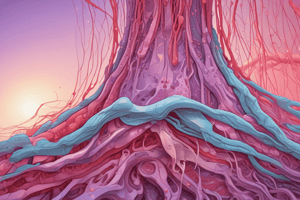Podcast
Questions and Answers
What is the characteristic of stratified squamous epithelium?
What is the characteristic of stratified squamous epithelium?
- Presence of goblet cells
- Presence of microvilli on the free surface
- Presence of multiple types of lateral wall cell junctions
- Presence of only desmosomes as lateral wall cell junctions (correct)
What is the function of keratin in stratified squamous epithelium?
What is the function of keratin in stratified squamous epithelium?
- To provide mechanical strength
- To facilitate absorption of water
- To produce mucus
- To make the surface impermeable to water (correct)
Which type of epithelium is seen in the lining of intestinal villi?
Which type of epithelium is seen in the lining of intestinal villi?
- Simple cuboidal epithelium
- Stratified squamous epithelium
- Simple columnar epithelium (correct)
- Pseudostratified epithelium
Which type of epithelium is seen in the tracheal lining?
Which type of epithelium is seen in the tracheal lining?
What is the characteristic of simple epithelium?
What is the characteristic of simple epithelium?
Which feature of epithelium allows for the selective regulation of substances entering or leaving the body?
Which feature of epithelium allows for the selective regulation of substances entering or leaving the body?
What is the primary function of zonula occludens in epithelial tissues?
What is the primary function of zonula occludens in epithelial tissues?
In which circumstance would metaplasia of epithelial tissue commonly occur?
In which circumstance would metaplasia of epithelial tissue commonly occur?
Which domain of epithelial cells is primarily responsible for cell communication and adhesion?
Which domain of epithelial cells is primarily responsible for cell communication and adhesion?
Which of the following is NOT a feature of epithelial tissue?
Which of the following is NOT a feature of epithelial tissue?
Flashcards are hidden until you start studying
Study Notes
Function and Characteristics of Epithelium
- Covers and lines all body surfaces and cavities, functioning in protection, secretion, absorption, and more.
- Protects from desiccation and bacterial invasion; facilitates excretion of sweat, urine, and CO2.
- Serves as a barrier to regulate substances entering or leaving the body while also separating self from non-self.
Structural Features
- Composed of densely packed cells exhibiting cellularity.
- Contains a basal lamina that supports and anchors the epithelium.
- Displays diversity in layers, sheets, glands, and organs, originating from all three germ layers.
- Features various cell junctions to maintain cohesion and communication between cells.
- Exhibits polarity with distinct regions: apical, lateral, and basal domains with specialized functions.
Vascularization and Regeneration
- Avascular in nature, relying on diffusion of nutrients from underlying connective tissue.
- Highly regenerative, with rates of mitosis that can vary, constantly replacing cells.
Classification of Epithelia
- Simple epithelium: a single layer resting on the basal lamina.
- Stratified epithelium: multiple layers, only the lowest layer contacts the basal lamina; type determined by the shape of the outermost layer.
Types of Simple Epithelium
- Squamous Epithelium: Thin, flat cells found in the lung alveoli and glomerulus.
- Simple Cuboidal Epithelium: Cube-shaped cells in kidney collecting ducts and thyroid gland.
- Simple Columnar Epithelium: Tall cells that protect inner surfaces; often has microvilli or cilia for enhanced function, located in large gland ducts and intestinal villi.
- Pseudostratified Epithelium: Appears stratified but all cells contact the basement membrane; commonly found in the trachea.
Types of Stratified Epithelium
- Stratified Squamous Epithelium: Provides resiliency against abrasion; can be keratinized (skin) or non-keratinized (oral cavity, esophagus).
- Stratified Cuboidal Epithelium: Typically consists of two layers, found in ducts of sweat glands and mammary glands.
Additional Characteristics
- Metaplasia: type transformation occurs under physiological/pathological conditions.
- Specialized cell junctions:
- Zonula Occludens: Tight junctions that create barriers between cells.
- Zonula Adherens: Belt desmosomes for cell adhesion.
- Macula Adherens: Desmosomes providing strong cell-to-cell adhesion.
- Gap Junctions: Facilitate communication between adjoining cells.
Basal Lamina and Reticular Lamina
- Comprises two layers: lamina lucida and lamina densa, forming the basement membrane in structures like alveoli and glomeruli.
- Reticular lamina provides anchoring by fibers from the connective tissue.
Surface Specializations
- Various structures such as glands, microvilli, cilia, and stereocilia enhance epithelial function, particularly in absorption and sensation.
Studying That Suits You
Use AI to generate personalized quizzes and flashcards to suit your learning preferences.




